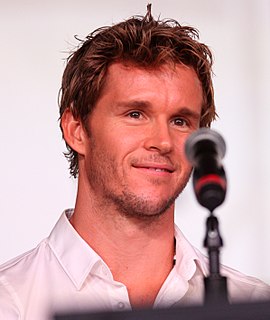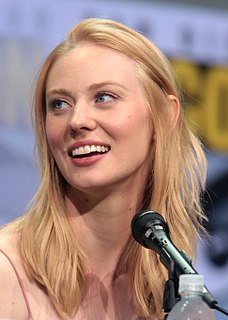A Quote by Clint Eastwood
The story [for the western genre] is everything. Whether it's a book or a screenplay, the story drives everything. And if you just go out and try to make one by putting on boots and jumping on a horse and riding off... If you don't have the material, the characters and the things to overcome and conflicts that give life to drama, you don't have it.
Related Quotes
A romance novel is more than just a story in which two people fall in love. It's a very specific form of genre fiction. Not every story with a horse and a ranch in it is a Western; not every story with a murder in it is a mystery; and not every book that includes a love story can be classified as a romance novel.
I always write a draft version of the novel in which I try to develop, not the story, not the plot, but the possibilities of the plot. I write without thinking much, trying to overcome all kinds of self-criticism, without stopping, without giving any consideration to the style or structure of the novel, only putting down on paper everything that can be used as raw material, very crude material for later development in the story.
Character drives the story, and the story drives the book. I don't think about where the action should go, or how much there should be, until it's required by the characters. When I find myself adding conflict just because I'm afraid that the reader might get bored, I know I've taken a wrong turn somewhere.
When a story or part of a story comes to me, I turn it over in my mind a long time before starting to write. I might make notes or take long drives or who knows what. By the time I give myself permission to write, I know certain things, though not everything. I know where the story is headed, and I know certain crucial points along the way.
A short story is confined to one mood, to which everything in the story pertains. Characters, setting, time, events, are all subject to the mood. And you can try more ephemeral, more fleeting things in a story - you can work more by suggestion - than in a novel. Less is resolved, more is suggested, perhaps.
As an actor, you never really set out to be a stand-out character. You just want to do justice to the story and enjoy playing it, and find all the different nooks and crannies of who someone is. For each part that you get, they're all special and you just try to give everything you can to each one. I don't know whether they're going to be stand out in that way or not factors into my work. They all stand out for me.
I read the paper every day. There are certain subjects that will catch my attention. I have an entire file of articles. Of course I make up the story, especially since most criminals are not very smart and fictional crime must be clever. I have to make sure the story I am telling is interesting and realistic. In this book I went on line and found out the manners of codes. I thought it interesting to use them as a jumping off point.
There is a story in Zen circles about a man and a horse. The horse is galloping quickly, and it appears that the man on the horse is going somewhere important. Another man standing alongside the road, shouts, «Where are you going?» and the first man replies, «I don't know! Ask the horse!» This is also our story. We are riding a horse, and we don't know where we are going and we can't stop. The horse is our habit energy pulling us along, and we are powerless.
You have to do three things really well to make a successful film. You have to tell a compelling story that has a story that is unpredictable, that keeps people on the edge of their seat where they can't wait to see what happens next. You then populate that story with really memorable and appealing characters. And then, you put that story and those characters in a believable world, not realistic but believable for the story that you're telling.




































